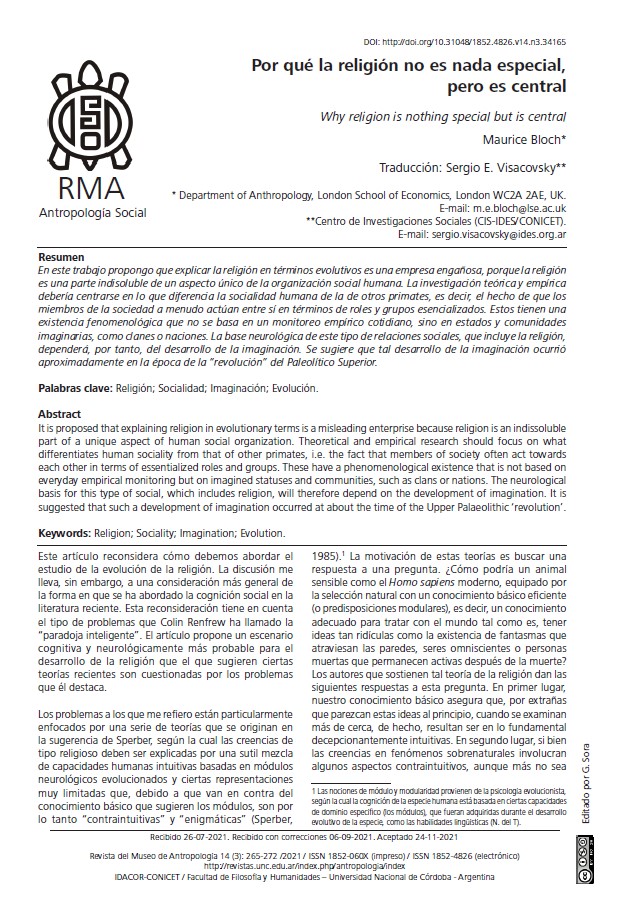Why religion is nothing special, but it is central
DOI:
https://doi.org/10.31048/1852.4826.v14.n3.34165Keywords:
Religion, Sociality, Imagination, EvolutionAbstract
It is proposed that explaining religion in evolutionary terms is a misleading enterprise because religion is an indissoluble part of a unique aspect of human social organization. Theoretical and empirical research should focus on what differentiates human sociality from that of other primates, i.e. the fact that members of society often act towards each other in terms of essentialized roles and groups. These have a phenomenological existence that is not based on everyday empirical monitoring but on imagined statuses and communities, such as clans or nations. The neurological basis for this type of social, which includes religion, will therefore depend on the development of imagination. It is suggested that such a development of imagination occurred at about the time of the Upper Palaeolithic ‘revolution’.
Downloads
References
Andersen, Benedict. (1983) Imagined communities: reflections on the origin and the spread of nationalism. London, UK: Verso.
Barrett, Justin L. (2004) Why would anyone believe in god? Walnut Creek, CA: Alta Mira Press.
Beard, Mary, John North y Simon Price. (1998) Religions of Rome, vol. 2. Cambridge, UK: Cambridge University Press.
Bloch, Maurice. (1986) From blessing to violence: history and ideology in the circumcision ritual of the Merina of Madagascar. Cambridge, UK: Cambridge University Press.
Bloch, Maurice. (1995) “The symbolism of tombs and houses in Austronesian societies with reference to two Malagasy cases”. Austronesian Studies August: 1–26.
Boyer, Pascal. (1994) The naturalness of religious ideas: a cognitive theory of religion. Berkeley, CA: University of California Press.
Boyer, Pascal. (2001) Religion explained: the evolutionary origins of religious thought. New York, NY: Basic Books.
De Waal, Frans. (2000) Chimpanzee politics: power and sex among apes. Baltimore, MD: Johns Hopkins University Press.
Dunbar, Robin. (2004) The human story. London, UK: Faber and Faber.
Evans-Pritchard, Edward Evan. (1948) The divine kingship of the Shilluk of the Nilotic Sudan. Cambridge, UK: Cambridge University Press.
Feeley-Harnik, Gillian. (1991) The green estate: restoring independence in Madagascar. Washington, DC: Smithsonian Institution Press.
Fuller, Christopher John. (1992) The camphor flame: popular Hinduism and society in India. Princeton, NJ: Princeton University Press.
Frankfort, Henri. (1948) Kingship and the gods. Chicago, IL: Chicago University Press.
Harris, Paul L. (2000) The work of the imagination: understanding children’s world. Oxford, UK: Blackwell.
Kopytoff, Igor. (1971) “Ancestors as elders”. Africa 41: 129–142.
Middelton, John. (1960) Lugbara religion. London, UK: Oxford University Press.
Nelson, Janet L. (1987) “The Lord’s anointed or the people’s choice: Carolingian royal rituals”. Cannadine, David y Simon Price (eds.) Rituals of royalty: power and ceremonial in traditional societies (pp. 137–180). Cambridge, UK: Cambridge University Press.
Pyysiainen, Ilkka. (2001) How religion works. Leiden, The Netherlands: Brill.
Radcliffe-Brown, Alfred Reginald. (1952) Structure and function in primitive society. London, UK: Cohen and West.
Rakoczy, Hannes. (2007) “Play, games and the development of collective intentionality”. Kalish, Charles W. y Mark A. Sabbagh (eds.) Conventionality in cognitive development: how children acquire representations in language thought and action (pp. 53–67). New directions in child and adolescent development, no. 115. San Francisco: Jossey-Bass.
Smith, Jonathan Z. (1982) Imagining religion: from Babylon to Jonestown. Chicago, IL: University of Chicago Press.
Sperber, Dan. (1985) “Anthropology and psychology: towards an epidemiology of representations”. Man (N.S.) 20: 73–89.
Wengrow, David. (2006) The archaeology of early Egypt. Social transformations in north-east Africa, 10,000–2,650 BC. Cambridge, UK: Cambridge University Press.

Downloads
Published
How to Cite
Issue
Section
License
Copyright (c) 2021 Sergio Visaconvsky

This work is licensed under a Creative Commons Attribution-NonCommercial-ShareAlike 4.0 International License.
Those authors who have publications with this Journalaccept the following terms:
a. Authors will retain their copyrights and guarantee the journal the right of first publication of their work, which will be simultaneously subject to the Creative Commons Attribution License (Licencia de reconocimiento de Creative Commons) that allows third parties to share the work as long as its author and his first publication in this journal.
b. Authors may adopt other non-exclusive licensing agreements for the distribution of the version of the published work (eg, deposit it in an institutional electronic file or publish it in a monographic volume) provided that the initial publication in this journal is indicated.
c. Authors are allowed and recommended to disseminate their work on the Internet (eg in institutional telematic archives or on their website) before and during the submission process, which can lead to interesting exchanges and increase citations of the published work. (See The Effect of Open Access - El efecto del acceso abierto)











